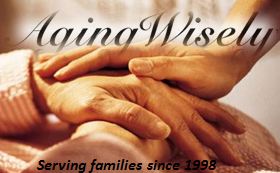Aging Wisely is proud to say that we will be celebrating 15 years of giving professional elder care advice and help in 2013. In 1998, Linda Chamberlain recognized that many families could benefit from expert professional advice and assistance navigating elder care.
A couple things particularly stood out as she decided to found Aging Wisely. First, the problems families faced were often comprehensive in nature. As an elder law attorney, she saw this as families came in to address legal problems but often had other pressing issues to address that were not of a legal nature. Essentially, these issues included care coordination, navigating options and various psychosocial issues. Often, families were dealing with time-sensitive issues and feeling strained trying to navigate solutions. Second, many community eldercare programs were either means-tested or prioritized by financial need (and many public services were “wait listed” i.e. not available immediately). She and colleagues realized that just because a family had some financial resources this did not mean they were not in need of help.
Aging Wisely’s care managers have helped hundreds of individuals and families over the years, in a wide array of circumstances. We have developed to meet changing needs and offer more comprehensive services. We wanted to take a few moments to say thank you to all of the professionals and families we have been privileged to work with, as well as to share some of our reflections on elder care.
Providing elder care help over the years, we see many commonalities in the issues families face, though each situation brings its unique circumstances. We have also seen things evolving over the years, such as:
- Elder care has become part of the family life cycle. More than 65 million people in the U.S., or greater than 1 in 4, provide care to an aging or disabled family member. With greater life expectancies and more chronic disease, most people will fill a caregiving role at some point and many will care for multiple family members.
- The path of elder care is more complex. Factors that make caregiving more complex for families today may include: “sandwich” generation realities (the overlap of caring for aging parents and supporting children), long-distance caregiving/family mobility, family dynamics/makeup (divorce and remarriage, step-children, etc.).
- Options for eldercare support are more diverse than before, but also more complicated to navigate. For example, there are 205 Assisted Living facilities doing business in Pinellas County, Florida, where Aging Wisely is based. If you take the Tampa Bay area (Hillsborough County/Tampa, Pasco County and Pinellas County) now you have 470 Assisted Living facilities within an hour or so.
- Professional help is also more widely available and there is a more developed structure of family caregiver assistance. Our professional association, the National Association of Professional Geriatric Care Managers, was founded in 1985 by a group of about 50 business owners who were some of the first entrepreneurs to provide such services. Over time, the association broadened and took steps such as requiring certification for membership. To learn more about the NAPGCM and its history, check out the Care Management Association History page. There are constantly new resources available and many different organizations to help. Sometimes it can be challenging to figure out who’s who and where to go for quality information, however.
What does all of this mean to families providing elder care (or even those who aren’t YET)?
- It is essential to plan for eldercare. Start conversations now, do some pre-planning, and don’t make assumptions. We offer an Essential Eldercare Checklist for families, covering various stages and steps to take along the way.
- While elder care is a very personal process, at some point your family is probably going to be best served by seeking professional help. With all the complexities mentioned above, you can save a lot of time, money and headaches by getting good advice from someone who knows the systems and processes.
- If your family is in disagreement or you can already foresee some complexities, be open with professionals about your concerns and ask for help in creative ways to proactively address them.
- If you have an aging loved one who lives at a distance, begin to gather resources in their local area. Start a process for family members to “check in” and keep an eye on how things are going. There are some great checklists available for “elderly warning signs” such as our “Should I Be Worried?“. Take some time to gather some phone numbers and basic information on services available where your loved one lives.
- Understand who you are dealing with and the parameters of what you are getting. A lot of eldercare services that seem like less expensive (or free) options are that way for a reason, or may cost you more in the long term. Different options will work for different people, but make sure you know what you’re getting and who you are dealing with before you decide.
Familes often come together this time of year, and either spot concerns or begin to think about the immediate future for an older loved one. Inquiries to senior care businesses tend to increase after the winter holidays and in to January and February. If you are visiting and notice concerns, we encourage you to call and find out what type of help might be available–or even how to begin approaching the situation. Unfortunately, health and other eldercare crises don’t take holidays, so if you are in a crisis situation we are always here to help as well.

 Popular Downloads
Popular Downloads


 Get Our Newsletter!
Get Our Newsletter! Mission Statement
Mission Statement

